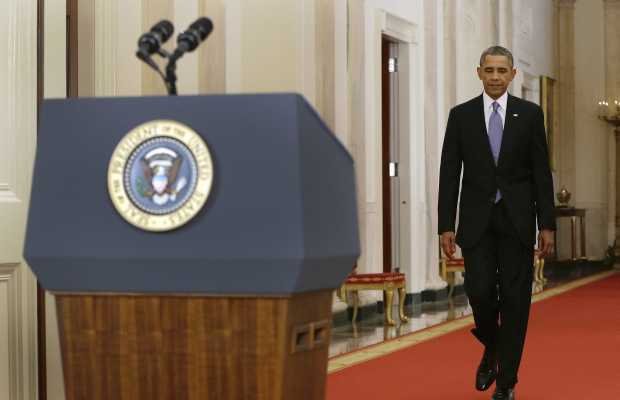Syria tensions ease allaying fears of oil price spikes

Ishaq Siddiqi, market strategist, ETX Capital on the likelihood of US intervention in Syria and possible market reaction:
Syria tensions ease considerably overnight as US President Obama in his speech acknowledges drumming support in Congress for a strike at Syria was hard found and has opted for diplomacy with Russia to disarm the Middle Eastern country of chemical weapons. In his speech, the President somewhat admitted defeat in the sense that his proposal was not as popular as anticipated amongst US lawmakers and he now has to hold back his plans of intervening via military response.
This certainly hit his credibility here as his tone changed quickly – Obama had to strike up a balanced tone this time around; the US is prepared to respond with a strike but let’s give diplomacy a chance. The market feels somewhat mixed on Syria at the moment as a result – encouraging that an imminent strike is off the cards and negotiations have been thrown to the UN before any action is taken.
Looks like Russia won this round and the international community appears to be endorsing the diplomacy route over a strike. Interesting that in some respects, the US was right…. Syria yesterday agreed to hand over control of chemical weapons, the first time the Assad regime acknowledged that it indeed stocks chemicals. One would think the vote to strike would sway in favour of the US now as their evidence may be accurate but the international community remains sceptical over the US intervention.
Can’t be too surprised here – US and allies haunted by spectre of previous military mishaps in the Middle East, namely Iraq war of 2003 in which the US did not find WMDs and entered the country illegally. Obama has less influence/sway in the international community for that reason with only really the UK, France and Israel approving of military action by the US.
Also, US lawmakers at the moment are too concerned about domestic matters – new budget must be formulated in order to raise the debt ceiling by mid October [US lawmakers have kicked this can down the road for too long now and must address the issue urgently] together with appointing a new Federal Reserve head. Additionally, the US does not have the kind of defence spending it once did with such a heavy debt burden and sequester cuts in place.
Good news for Assad – he might just about get away again on the reluctance of the international community to actually take some action, be it military force or sanctions. Assad’s a clever guy – he knows Russia, Iran and China have his back and as long as they fight for diplomacy, remind the West of their mistakes in the past and wave the matter of legality in their faces, he’s got more time to stay in power, build up his arsenal with the help of Russia and Iran and pose a bigger threat if and when military action by the West is pursued. It is in fact the inability of the polarized international community that has allowed Assad to cling onto power for this long and will continue to be the reason for why he may stick around for longer.
The response in financial markets; global equities steady on easing Syria fears but on the soft side as investors take some cash off the table as the uncertainty over potential Fed tapering of stimulus remains the narrative driving price-action. Oil markets respond more favourably as Brent is now at $112 p/b versus $116 p/b we saw last week and WTI at $107 p/b off around $111 p/b seen last week. Oil prices are trading higher at the moment but by no means at a worrying level. For the market, the big concern over a Syria strike is of course the implications on the MidEast region and the impact on the global economy. An involvement of Iran and Israel in this “war” would have sent shockwaves across markets as it threatens to engulf the whole region with oil supply likely to be disrupted.
And, when it comes to the global economy, it’s well documented that a $10 rise in the price of oil equates to 0.5% shaved off from US GDP – now at a time when the US and UK economies are recovering, euro zone showing tentative signs of recovery and China bouncing back after a turbulent first half of the year, spikes in oil prices lead to increase pressures for inflation which could choke these recoveries we are seeing. That could even cause the Fed to hold back from tapering asset purchases just yet, so for investors, this diplomatic approach does provide some comfort in the short-term.
In the long term however, negotiations are known to break down and the Obama himself does not appear to be too hopeful that Syria will comply so he’s still got his finger on the trigger. No strike for now but that doesn’t mean this situation is far from over. Over to the UN now to see if the US and Russia can hammer out an agreement to teach Syria a lesson…. in the diplomatic way.